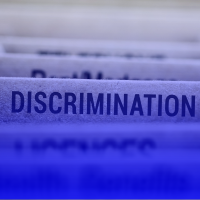
Education for Lawyers – Opening of a Council of Europe Information Centre for Belarusians in Vilnius – Concept for Anti-Discrimination Legislation. The Council of Europe (CoE) continues its steadfast support for enhancing the capacity of Belarusian experts in the fields of equality and non-discrimination. The Belarusian Helsinki Committee contributes its expertise to this important work.
On 4–5 December 2024, a two-day seminar, “European Standards of Equality and Combating Discrimination”, was held.
The event was organized as part of the joint EU-CoE program “Partnership for Good Governance” and the CoE’s “Cooperation with Belarusian Democratic Forces and Civil Society in Combating Discrimination” program. Its goal is to support Belarusian civil society actors and democratic forces in strengthening their understanding and advocacy for equality and anti-discrimination measures in line with EU legislation and CoE standards.
Speaking at the event's opening, Jeroen Schokkenbroek, Director of the CoE’s Equal Rights and Dignity Directorate, stated:
“This initiative not only underscores a commitment to equality and inclusivity but also marks a significant step in empowering Belarusian democratic forces and civil society to effectively advocate for human rights and democratic values. Training materials available in Belarusian will ensure that CoE standards are effectively implemented across the board.”
Ekaterina Deikalo, representing the Belarusian Helsinki Committee, emphasized:
“This event aims to strengthen the resilience and capacity of those who can contribute to the realization of equality and non-discrimination principles in Belarusian society. The adaptation of resources into Belarusian enables civil society actors to better protect and promote human rights, particularly amidst the growing cultural, educational, and legal expansion by Russia. This initiative visibly demonstrates support for the democratic aspirations of the Belarusian people.”
This seminar is the first in a series of training sessions on European anti-discrimination standards organized by the CoE in collaboration with the Belarusian Helsinki Committee. In the coming months, participants will gain access to HELP online courses translated into Belarusian, with support from BHC experts. (Note: This training series is part of the 2024–2025 initiatives agreed upon by the CoE Contact Group and endorsed by the Committee of Ministers in January 2024.)
Subscribe to our newsletter for NGOs, legal professionals, and activists to stay informed about similar educational opportunities.
Cristian Urse, Deputy to the Director, Directorate of Political Affairs and External Relations at the CoE, highlighted the broader significance of the seminar:
“Cooperation with Belarusian democratic forces and civil society is a key priority for the Council of Europe. This project forms part of the CoE’s activities under the aegis of the Contact Group, established in 2022 to provide support and expertise on European standards to Belarusian counterparts. The recently signed agreement between the Council of Europe and the Government of Lithuania to create an Information Centre for Belarusians in Vilnius will strengthen our efforts in this area.”
In spring 2024, the “Concept for a System of Measures to Combat Discrimination and Ensure Equality in Belarus, including the Law on Equality and Non-Discrimination” was introduced. This concept forms a cornerstone of the comprehensive legal reforms required for Belarus.
The document was developed under the 2023 Action Plan adopted by the CoE’s Belarus Contact Group, with contributions from Belarusian civil society experts and CoE specialists, coordinated by the Belarusian Helsinki Committee.
In post-democratic transition, this document could:
-
Serve as the foundation for legislation on equality and non-discrimination, including the adoption of the Law on Equality and Non-Discrimination;
-
Be utilized by courts to interpret existing provisions prior to the law’s adoption;
-
Guide the creation of detailed recommendations and clarifications for judges, prosecutors, and justice officials.
Currently, the document serves as:
-
A benchmark for reform development in other areas (e.g., economy, education, healthcare);
-
A professional development tool for legal and public administration specialists;
-
A resource to promote societal awareness and understanding of discrimination;
-
An impulse for public discussion.




